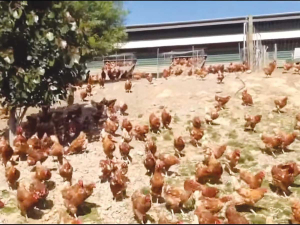NZVA urges animal owners to help fight antibiotic resistance through preventative care
Animal owners can help protect life-saving antibiotics from resistant bacteria by keeping their animals healthy, says the New Zealand Veterinary Association.
 PIANZ was honoured with the Antimicrobial Resistance (AMR) Award for reducing the use of the antibiotic zinc bacitracin (ZB).
PIANZ was honoured with the Antimicrobial Resistance (AMR) Award for reducing the use of the antibiotic zinc bacitracin (ZB).
The Poultry Industry Association of New Zealand (PIANZ) has won the New Zealand Veterinary Association (NZVA) Antimicrobial Resistance (AMR) Award.
It is the first time the award has been won by an industry body.
Presented earlier this month at the annual NZVA Awards, PIANZ was honoured for reducing the use of the antibiotic zinc bacitracin (ZB).
Previously, New Zealand chickens raised for meat were fed ZB along with their daily feed, as a preventative measure against disease. By introducing gut health support, and improving stock management techniques, the industry has successfully phased out ZB as a preventative measure, which had been a major contributor to New Zealand’s overall antimicrobial use.
PIANZ says the New Zealand poultry industry is now one of the few in the world that uses no antibiotics prophylactically at all.
NZVA chief executive Kevin Bryant congratulated PIANZ for its commitment to addressing the challenges of AMR.
“This award is greatly deserved,” he says.
“PIANZ has demonstrated leadership and become a great advocate for reducing our reliance on antibiotic use. It is a wonderful example of an industry coming together to find solutions for a problem that not only threatens animal health, but human health as well.”
AMR happens when viruses, bacteria, or parasites change and no longer respond to medicine, making them difficult or impossible to treat. Vaccinations are a critical tool in preventing the development and spread of drug-resistant viruses and bacteria. The World Health Organization (WHO) has said antimicrobial resistance is one of the top global public health and development threats.
PIANZ executive director Michael Brooks says he was proud the industry had achieved its collective goal of prophylactically eliminating the use of ZB, which had been used to prevent a commonly occurring disease in the chicken’s gut.
“The New Zealand poultry industry has worked together to achieve the significant milestone of using no antibiotics at all prophylactically,” he said. “Our commitment has been to help reduce AMR overall, and we are proud of the impact we have been able to make in this space.”
The industry’s work directly supports the NZVA’s goal that by 2030 New Zealand will not need antibiotics for the maintenance of animal health and wellness. To achieve this, it advocates that animal owners and farmers work alongside their veterinarians to ensure best practice care and nutrition is provided, and that animal vaccinations are kept up-to-date.
Changed logos on shirts otherwise it will be business as usual when Fonterra’s consumer and related businesses are expected to change hands next month.
Reflecting on the past year, Horticulture New Zealand chief executive Kate Scott says there has been a lot to celebrate.
Ministry for Primary Industries (MPI) Director General Ray Smith is giving a big shout-out to the horticulture sector, especially kiwifruit.
Early forecasts for New Zealand's apples and pears point to a standout season marked by exceptional fruit quality and high pack-out rates.
Tickets are now available for Beef + Lamb New Zealand’s (B+LNZ) Out the Gate, returning from 19-21 May 2026 at Te Pae, Christchurch.
Dairy Women's Network (DWN) is welcoming AgriHealth as a new partner.

OPINION: Here w go: the election date is set for November 7 and the politicians are out of the gate…
OPINION: ECan data was released a few days ago showing Canterbury farmers have made “giant strides on environmental performance”.